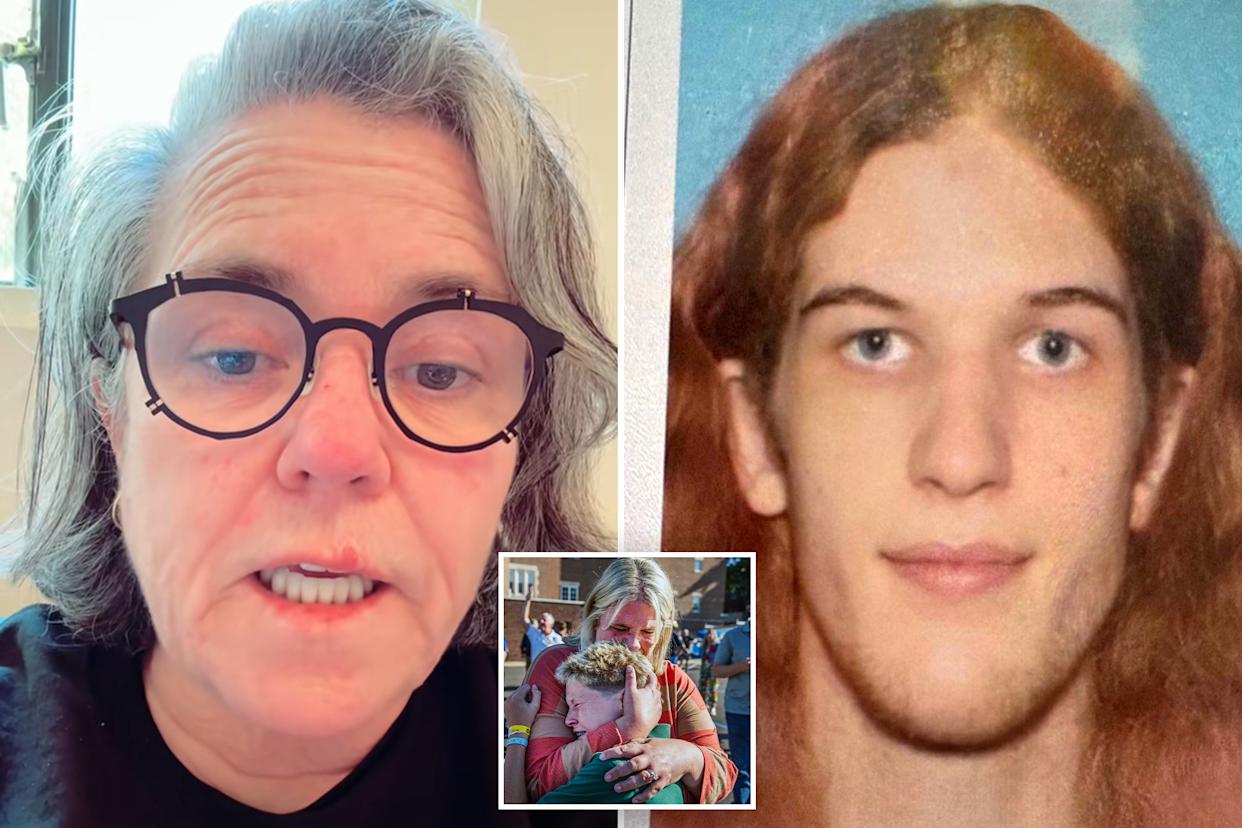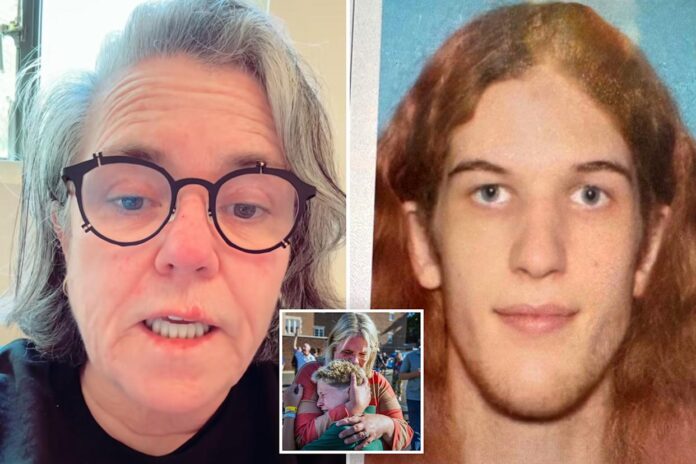😱 Rosie O’Donnell’s jaw-dropping apology for labeling the Minneapolis school shooter a MAGA supporter has everyone talking—but it’s her THREE-WORD statement that’s left the internet in a frenzy! What did she say that’s sparking such outrage and disbelief? The truth behind this tragedy will leave you speechless.
👉 Click to uncover the shocking details and see what Rosie said:

On August 27, 2025, the Annunciation Catholic Church in Minneapolis became the site of a horrific tragedy when 23-year-old Robin Westman opened fire during a school Mass, killing two children and injuring 18 others before dying by suicide. In the aftermath, comedian and former talk show host Rosie O’Donnell made headlines with a now-deleted TikTok video falsely claiming the shooter was a “Republican, MAGA person, white supremacist.” Days later, O’Donnell issued an apology that included a three-word statement—“I messed up”—that has ignited a firestorm of reactions, from praise for her accountability to accusations of insincerity. This article delves into the context of O’Donnell’s remarks, the public’s response, and the broader implications of the tragedy.
The Shooting and Its Aftermath
The attack at Annunciation Catholic Church was a devastating blow to the Minneapolis community. Robin Westman, who identified as a transgender woman, fired through stained-glass windows during a morning Mass attended by students from the attached school. Two children, 8-year-old Fletcher Merkel and 10-year-old Harper Moyski, were killed, and 18 others, including 15 children and three elderly parishioners, were injured. Westman, who legally changed their name from Robert in 2020, died by a self-inflicted gunshot wound as police arrived.
Investigators quickly uncovered evidence that painted a complex picture of Westman’s motives. A manifesto and videos posted online revealed a fixation on previous mass shooters, anti-Catholic and antisemitic sentiments, and a message scrawled on a firearm magazine that read “Kill Donald Trump.” FBI Director Kash Patel described the attack as an act of “domestic terrorism” driven by a “hate-filled ideology,” citing Westman’s writings against Christians, Jews, Black people, Hispanic people, and Israel. Minneapolis Police Chief Brian O’Hara noted Westman’s “deranged obsession” with mass shootings, adding to the chilling nature of the crime.
Rosie O’Donnell’s Initial Claims
On August 28, 2025, Rosie O’Donnell, a vocal critic of former President Donald Trump, posted a TikTok video reacting to the shooting. Drawing parallels to the 1999 Columbine massacre, she expressed dismay at the persistence of school shootings in America. However, her comments took a controversial turn when she claimed, without evidence, that the shooter was a “white guy, Republican, MAGA person, white supremacist.” She further criticized the National Rifle Association (NRA), calling it a “terrorist organization,” and questioned when America would have “enough” of gun violence and Trump’s influence.
O’Donnell’s remarks, made in a now-deleted video, sparked immediate backlash, particularly among conservative audiences who pointed out the inaccuracies. Westman’s writings and videos clearly indicated hostility toward Trump and a rejection of right-wing ideologies, contradicting O’Donnell’s assumptions. Social media platforms, including X, buzzed with criticism, with users like @LangmanVince calling O’Donnell “mentally unstable” for her claims.
The Apology and the Three-Word Statement
By August 31, 2025, O’Donnell recognized her error and posted an apology video on TikTok, accompanied by a caption: “my apologies to maga for saying the school shooter was one of u – that is incorrect – i made a mistake – i didn’t research – im sorry – i assumed and thats always wrong.” In the video, she admitted to not doing her “due diligence” and assuming Westman fit a “standard MO” of “NRA-loving kind of gun people.” The apology culminated in a succinct three-word statement: “I messed up.”
While some praised O’Donnell for taking accountability, others found the apology lacking. Comments on her Instagram post ranged from supportive—“Accountability at its finest. Bravo, Rosie”—to skeptical, with one user calling it “the most unapologetic apology ever.” Another wrote, “She’s not sorry, she still means exactly what she said.” O’Donnell responded to one critic, writing, “I was wrong – and I apologize – what more do [you] want?” The brevity of “I messed up” became a focal point, with detractors arguing it failed to address the gravity of her initial claims or the pain caused to those affected by the shooting.
Public Reaction and Political Context
The controversy surrounding O’Donnell’s apology reflects the polarized state of American discourse, particularly around issues of gun violence, political ideology, and identity. Her initial video was seen by some as a knee-jerk attempt to tie the tragedy to a political narrative, a move critics argued was irresponsible given the lack of evidence. The shooter’s transgender identity and anti-Trump sentiments complicated the narrative further, with conservative outlets like Breitbart and The Gateway Pundit framing O’Donnell’s remarks as part of a broader pattern of “smearing” Trump supporters.
On X, sentiments varied. Some users, like @PolitiBunny, praised those who stand against divisive rhetoric, while others, like @HarleyShah, emphasized the importance of remorse in addressing public mistakes. O’Donnell’s history of outspoken criticism of Trump, including her move to Ireland following his 2024 re-election, added fuel to the debate, with some accusing her of bias clouding her judgment.
The three-word phrase “I messed up” became a lightning rod for discussion. Supporters viewed it as a concise admission of fault, aligning with O’Donnell’s reputation for candidness. Critics, however, saw it as flippant, arguing that it trivialized the harm caused by her initial accusations. The phrase’s simplicity stood in stark contrast to the complexity of the tragedy, prompting debates about the nature of public apologies and their role in healing or exacerbating divisions.
The Broader Implications
O’Donnell’s misstep highlights the dangers of rushing to judgment in the wake of tragedies. The Minneapolis shooting, like many mass shootings, defies easy categorization. Westman’s actions were driven by a mix of personal struggles, ideological hatred, and mental health issues, none of which neatly align with a single political or social narrative. By assuming Westman was a “MAGA supporter,” O’Donnell inadvertently perpetuated a stereotype that oversimplified the shooter’s motives and inflamed political tensions.
The incident also raises questions about the role of public figures in shaping discourse around mass shootings. O’Donnell’s platform, amplified by her celebrity status, gave her initial claims significant reach, but it also magnified the fallout when those claims were proven false. Her apology, while a step toward accountability, underscores the need for fact-checking and restraint in emotionally charged moments. As one X user noted, “People need to fact check every single political thing that they see because the majority of it is a lie.”
The Minneapolis Community and the Path Forward
Beyond the controversy surrounding O’Donnell, the Minneapolis community continues to grapple with the aftermath of the shooting. Vigils have been held for Fletcher Merkel and Harper Moyski, and the injured are receiving ongoing care. Parents and community leaders have called for stronger gun laws and better mental health resources, while others, including Pope Leo, have urged an end to the “pandemic of arms.”
The shooter’s transgender identity has also sparked heated debate, with some outlets citing it as part of a broader trend of mass shootings involving individuals with gender dysphoria. Sebastian Gorka, on CNN’s “State of the Union,” claimed that “seven mass shootings in just a couple of years” involved transgender or nonbinary individuals, though this claim remains contentious and lacks comprehensive data.
For the Westman family, the tragedy is deeply personal. Mary Grace Westman, Robin’s mother, has remained silent beyond a brief statement expressing grief. Her connection to Annunciation Catholic Church, where she worked for decades, adds a layer of complexity to the family’s story. The community, too, faces the challenge of healing while navigating the politicization of the tragedy.
Conclusion: A Call for Reflection
Rosie O’Donnell’s apology, punctuated by her three-word statement “I messed up,” serves as a reminder of the power and responsibility that come with public platforms. The Minneapolis shooting is a tragedy that defies simple explanations, rooted in a web of personal, ideological, and societal factors. As the nation mourns, the focus must shift from political point-scoring to understanding the root causes of such violence and supporting the affected community.
O’Donnell’s misstep, while significant, is a small part of a larger story. The real challenge lies in addressing the systemic issues—mental health, gun access, and societal polarization—that enable such tragedies. As Minneapolis heals, and as the nation reflects, the hope is that dialogue can move beyond blame and toward solutions. For now, O’Donnell’s apology, however imperfect, is a step toward acknowledging the complexity of truth in a fractured world.
